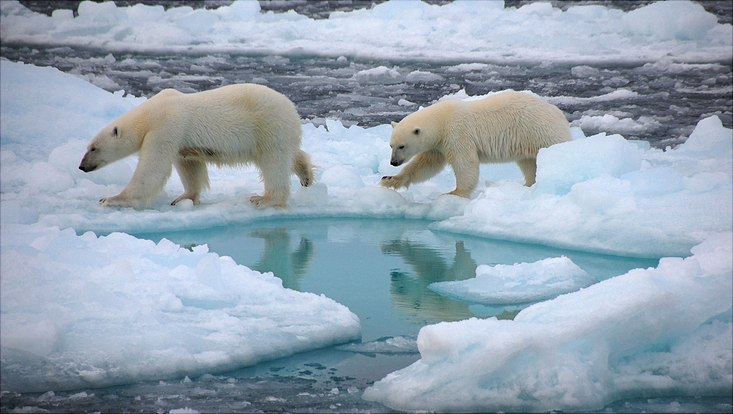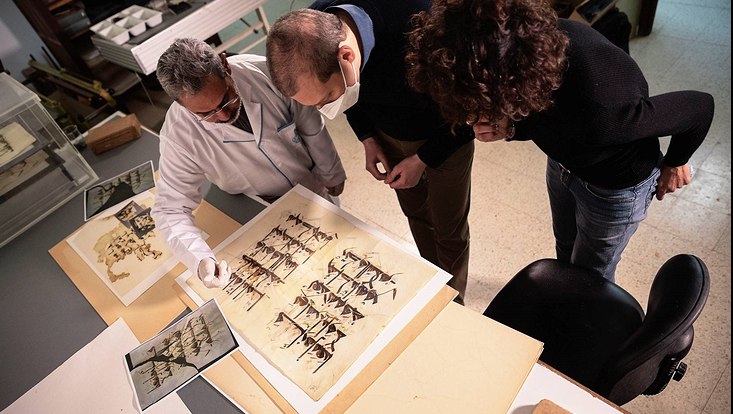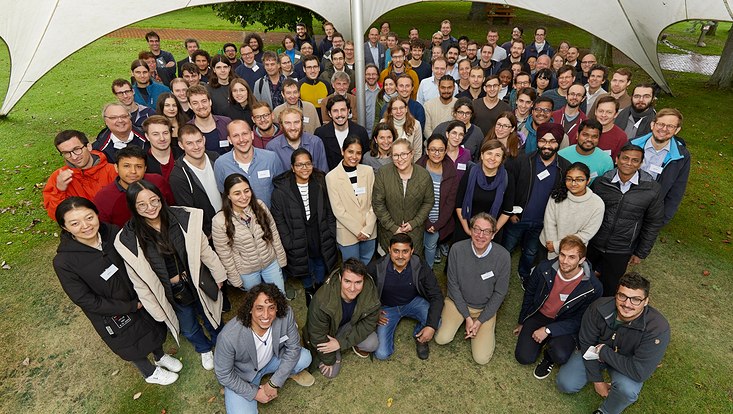What have they accomplished so far?Taking stock of Climate, Climatic Change, and Society
15 May 2023, by Stephanie Janssen

Photo: D. Notz
Since 2019, Universität Hamburg has been a University of Excellence. A year earlier, 4 clusters of excellence received grants. What has been accomplished since then and how has the funding been used? In the Cluster of Excellence Climate, Climatic Change, and Society (CLICCS), 269 researchers from 16 different disciplines are working on finding answers to the overarching question: What climate futures are possible, and which of these potential futures are plausible? Their research takes a uniquely broad approach to climate change.
With the current Hamburg Climate Futures Outlook, the Cluster of Excellence CLICCS has demonstrated: It is not currently plausible, that is, it cannot be reasonably expected, that the increase in global temperature will be kept to a maximum of 1.5 degrees Celsius. With the help of a newly developed analysis framework, CLICCS has identified and analyzed 10 key social factors which bring about a shift from fossil fuels. None of these key factors show a shift sufficient to amount to a complete decarbonization of society by 2050.
This analysis of social dynamics, the first of its kind in the world, has now resulted in a Mercator Professorship which establishes a new field of research into the social plausibility of climate futures in the Faculty of Business, Economics and Social Sciences at Universität Hamburg. In the study, CLICCS analyzed physical processes that could serve as potential tipping points, proving that societal change has a greater influence.
Interdisciplinary research, plausibility analysis
CLICCS provides answers to questions of plausible climate futures across a range of areas. For example, a study has shown for the first time that drastic land losses should be expected in the future around the Arctic Ocean, due to the thawing of the permafrost. In addition, it also showed for the first time that a huge warm-water mass in the Pacific does not occur sporadically as previously thought, but has become a long-term feature, and can be clearly traced back to man-made emissions. This mass makes extreme heat waves more likely in the northeast Pacific.
CLICCS has also succeeded in creating the first modeling of the global marine carbon cycle of the coastal ocean with its ICON-Coast climate model. This model can, for example, help to identify how much man-made carbon dioxide the coasts can absorb in the future. CLICCS researchers use a transdisciplinary approach to raise awareness and acceptance of future nature-based measures to protect the coast. These provide a promising option to facilitate the coastal adaption required. CLICCS has also shown that a majority of Germans would vote for a low-level tax on meat products, even though the key motivating factor here was improving animal welfare rather than contributing to climate protection.
In total, since its inception, CLICCS has published more than 540 publications in peer-reviewed journals as a direct result of its research. These are garnering international attention even beyond the scientific community, with the general public also showing interest in CLICCS findings. As a result, over 2,700 reports have been released in newspapers, television, radio, and online media so far. The Cluster of Excellence Climate, Climatic Change, and Society provides regular information and updates about their research in CLICCS Quarterly magazine.
Broad parameters need broad expertise
An interdisciplinary approach allows for these comprehensive knowledge gains: from oceanography to peace research, from economics to biology, CLICCS weaves these knowledge strands together to create a broad scientific tapestry. It has also created four new professorships to further expand its expertise, in the fields of sea ice and cryosphere, climate statistics and climate extremes, digital social sciences, and sustainability economics. In total, 80 professors are working closely on CLICCS research projects.
This broad expertise is much sought after: CLICCS spokesperson Anita Engels, Grischa Perino, Ursula Schröder and Jürgen Scheffran provide advice to various committees in the German federal government. Alexander Bassen and Grischa Perino are advisors to the European Union. Victor Brovkin, Herman Held, Jochem Marotzke, Christian Möllmann, Dirk Notz, Beate Ratter, Jana Sillmann, and Christian Möllmann contributed as authors of the United Nations IPCC (International Panel on Climate Change) Assessment Report.
International networks: tomorrow’s climate research today
CLICCS is currently financing 61 doctoral positions and 24 postdoctoral researchers. The School of Integrated Climate and Earth System Sciences (SICSS) provides training and professional development right at the heart of climate research for early career researchers in the early and mid-phases of their careers. This has allowed 91 master’s students from 36 countries to benefit from the interdisciplinary curriculum over the last 4 years, bringing cutting-edge climate relevant natural and social sciences together. SICSS graduate program offers early career researchers an opportunity to round out their profile with workshops on academic writing, intercultural training, podcast production, and career development.
CLICCS success is based on close and long-nurtured connections, with international cooperations with the University of Melbourne (Australia), North Western (Illinois, USA), and Lund (Sweden). CLICCS also works with associations all across Germany, such as the Deutsche Klima-Konsortium, the German Marine Research Consortium e.V., and the German Marine Research Alliance. Within CLICCS itself, 11 partner institutions work together. In addition to the Max Planck Institute for Meteorology, the Helmholtz-Zentrum Hereon GmbH, the Climate Service Center Germany (GERICS), the German Institute for Global and Area Studies (GIGA) and the German Climate Computing Center (DKRZ), there are 3 other universities and the Federal Waterways Engineering and Research Institute, the Bundesamt für Seeschifffahrt und Hydrographie (BSH) and the German Weather Service who contribute to the Cluster of Excellence CLICCS, run by the Center for Earth System Research and Sustainability (CEN) at Universität Hamburg.
Series taking stock of the clusters of excellence and Universität Hamburg—University of Excellence
In July 2019, Universität Hamburg was deemed a University of Excellence by the German Council of Science and the Federal and German Governments. It was one of only 11 universities and university collaborations in Germany to earn the distinction. Funding began in November 2019.
Universities had to have at least 2 clusters of excellence to apply for recognition as a “University of Excellence.” Universität Hamburg has gone beyond that, hosting 4 clusters since 2018. In this series, we present the achievements of the 4 clusters at Universität Hamburg—University of Excellence so far.
Read more of our reports on Taking Stock of the Excellence Strategy in the Cluster of Excellence Quantum Universe and the University of Excellence over the coming days.



